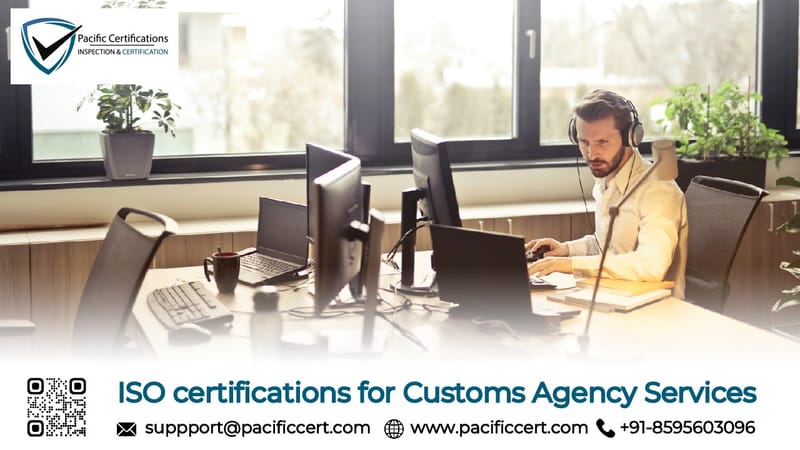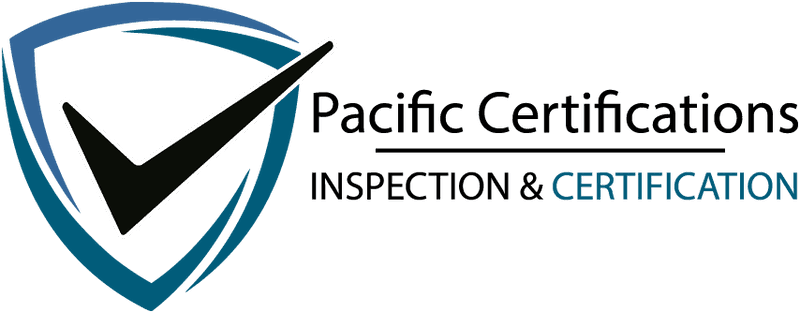ISO Certifications for Customs Agency Services, Requirements and Benefits

In today’s globalized economy, the role of Customs Agencies is pivotal in facilitating international trade. These agencies ensure that goods move across borders smoothly while adhering to national and international regulations. Given the complexity of the tasks involved, ranging from tariff classification to compliance with import and export laws, it is crucial for Customs Agencies to operate with the highest standards of quality, security, and efficiency.
Ready to enhance your Customs Services with ISO certification? Contact us today at [email protected]or call +91-8595603096.
Applicable ISO Standards for Customs Agency Services
Several ISO standards are particularly relevant to Customs Agency, each addressing different aspects of their operations:
ISO 9001:2015 - Quality Management Systems: ISO 9001 is the most widely recognized standard for quality management systems, this standard helps ensure consistent service quality, enhances customer satisfaction, and fosters continuous improvement in operational processes.
ISO 27001:2022 - Information Security Management Systems: This standard helps agencies establish a robust information security management system (ISMS) to protect against data breaches, ensure data integrity, and comply with legal requirements.
ISO 14001:2015 - Environmental Management Systems: ISO 14001 helps these agencies manage their environmental responsibilities systematically, improving their environmental performance and ensuring compliance with national and international environmental laws.
ISO 45001:2018 - Occupational Health and Safety Management Systems: The well-being of employees is a priority for any organization. ISO 45001 provides a framework for managing occupational health and safety (OH&S) risks, helping Customs Agencies create a safe and healthy workplace.
ISO 31000:2018 - Risk Management: Customs Agencies face various risks, including legal, financial, operational, and reputational risks. ISO 31000 provides guidelines for identifying, assessing, and managing these risks effectively.
ISO 37001:2016 - Anti-Bribery Management Systems: ISO 37001 helps Customs Agencies implement a management system that prevents, detects, and addresses bribery and other forms of corruption.
Click here to find out more applicable standards to your industry
By implementing these standards, Customs Agencies can enhance their operational efficiency, mitigate risks, and build trust with their clients and stakeholders.
If you're seeking ISO certification for your Customs Agency Services, reach out to us at [email protected] or by phone at +91-8595603096.
How We Can Help
At Pacific Certifications, we specialize in helping organizations achieve and maintain ISO certifications. As an accredited certification body, our role is to audit and certify your management systems against the applicable ISO standards. We do not offer consultancy, gap analysis, training, or implementation services; instead, we focus exclusively on providing impartial and rigorous audits that lead to ISO certification.
Our certification process begins with a thorough audit of your existing management systems to assess their compliance with the relevant ISO standards. We then issue the certification, which serves as a formal recognition of your organization’s commitment to excellence. With our expertise, you can be confident that your Customs Agency meets the highest standards of quality, security, and efficiency.
Looking to obtain ISO certification for your Customs Agency Services? Get in touch with us at [email protected] or call +91-8595603096 for more information.
Requirements & Benefits of ISO Standards for Customs Agency Services
Customs Agency Services are integral to international trade, ensuring the smooth and lawful import and export of goods. Adopting ISO standards can significantly enhance the efficiency, security, and reliability of these services. Below are the specific requirements and benefits of key ISO standards applicable to Customs Agency Services.
ISO 9001: Quality Management Systems
Requirements:
- Leadership and Commitment: Top management must demonstrate leadership and commitment to the quality management system.
- Risk-Based Thinking: Identification and mitigation of risks related to customs processes.
- Customer Focus: Understanding and meeting the needs of clients involved in international trade.
- Process Approach: Streamlining and optimizing customs clearance processes to enhance efficiency.
- Continuous Improvement: Regularly monitoring and improving customs procedures and service quality.
Benefits:
- Standardized processes lead to faster clearance times and fewer errors.
- Consistent and high-quality service improves client trust and satisfaction.
- Helps in adhering to legal and regulatory requirements in different countries.
- Enhances the reliability of customs procedures across different locations.
ISO 14001: Environmental Management Systems
Requirements:
- Environmental Policy: Developing an environmental policy that includes commitments to compliance, pollution prevention, and continual improvement.
- Environmental Aspects: Identifying and managing environmental aspects and impacts related to customs operations, such as waste management or emissions.
- Compliance Obligations: Understanding and complying with environmental legislation and regulations.
- Performance Evaluation: Regularly assessing environmental performance through monitoring and measurement.
Benefits:
- Efficient management of resources and waste minimization in customs operations.
- Assurance of compliance with environmental laws, reducing the risk of penalties.
- Demonstrates a commitment to environmental stewardship, which can be a competitive advantage.
- Lower operational costs through energy efficiency and waste reduction.
ISO 45001: Occupational Health and Safety Management Systems
Requirements:
- Hazard Identification: Identifying and assessing risks to worker health and safety within customs operations.
- Legal Compliance: Ensuring compliance with occupational health and safety regulations.
- Worker Participation: Involving employees in safety management processes and decision-making.
- Incident Investigation: Establishing procedures for investigating incidents and implementing corrective actions.
Benefits:
- A safer working environment leads to higher employee morale and productivity.
- Reduces the likelihood of workplace accidents, leading to fewer disruptions and financial losses.
- Ensures that customs services comply with national and international health and safety regulations.
- Lower insurance premiums and fewer compensation claims due to improved safety performance.
ISO 27001: Information Security Management Systems
Requirements:
- Risk Assessment: Identifying and assessing risks related to information security in customs operations.
- Access Control: Implementing controls to protect sensitive data from unauthorized access.
- Incident Management: Establishing procedures for responding to information security incidents.
- Continuous Monitoring: Regularly reviewing and updating information security measures to address new threats.
Benefits:
- Protects sensitive information related to trade, client data, and customs documentation from breaches.
- Helps meet legal requirements related to data protection and privacy.
- Minimizes disruptions caused by information security incidents.
- Enhances trust among clients and partners by ensuring the confidentiality and integrity of data.
ISO 31000: Risk Management
Requirements:
- Risk Management Framework: Establishing a risk management framework aligned with the organization's objectives.
- Risk Assessment: Identifying, analyzing, and evaluating risks related to customs operations.
- Risk Treatment: Implementing measures to mitigate identified risks.
- Monitoring and Review: Continuously monitoring the risk environment and reviewing the effectiveness of risk management strategies.
Benefits:
- Anticipates and mitigates risks that could impact customs operations.
- Provides a structured approach to making decisions that balance risks and opportunities.
- Enhances the ability to withstand and recover from adverse events.
- Builds trust among clients and partners by demonstrating a commitment to managing risks effectively.
Implementing these ISO standards within Customs Agency Services can lead to numerous benefits, including enhanced operational efficiency and improved compliance with regulations. By adhering to these standards, customs agencies can ensure that their operations are effective and resilient and sustainable in a rapidly evolving global trade environment.
These standards, when implemented together, provide a comprehensive framework for managing quality, environment, safety, information security, and risk in customs operations, making them more reliable, secure, and competitive in the global marketplace.
For professional assistance with ISO certification for Customs Agency Services, contact us at [email protected] or call +91-8595603096.
Market News
As of 2024, the demand for ISO certification among Customs Agencies is on the rise, driven by increasing global trade volumes and the need for enhanced security and compliance measures.
A report by the International Chamber of Commerce (ICC) highlighted that global trade is expected to grow by 3% annually over the next five years, with customs processes becoming more complex due to evolving regulations and the adoption of digital technologies.
In response to these trends, more Customs Agencies are seeking ISO certifications to stay competitive and meet the expectations of international trade partners.
The adoption of ISO 27001, in particular, is growing rapidly as agencies recognize the importance of robust information security management in the face of rising cyber threats. Additionally, the push for sustainability is driving more agencies to adopt ISO 14001, aligning their operations with global environmental goals.
These trends indicate that ISO certifications are not just regulatory requirements but a strategic tools for Customs Agencies looking to thrive in a complex global trade environment.
Interested in ISO certification for your Customs Agency Services? Reach out to us at [email protected] or call +91-8595603096 for expert guidance.
Certification Process for ISO Standards for Customs Agency Services
The process of obtaining ISO certification for Customs Services involves several key steps:
- Initial Assessment: The certification process begins with an initial assessment, where your organization’s existing management systems are reviewed against the requirements of the relevant ISO standards.
- Documentation Review: The next step involves a detailed review of your organization’s documentation, including policies, procedures, and records related to the management system.
- Implementation: If any gaps were identified during the initial assessment, your organization will need to implement the necessary changes to meet the ISO requirements.
- Internal Audit: Before the certification audit, your organization should conduct an internal audit to ensure that the management system is functioning effectively and meets the ISO requirements.
- Certification Audit: The certification audit is conducted by Pacific Certifications, an accredited certification body. Our auditors will assess your management system to determine its compliance with the ISO standards.
- Issuance of Certification: If your organization’s management system meets the requirements of the ISO standard, Pacific Certifications will issue the certification. This certification is valid for three years, during which your organization will need to undergo periodic surveillance audits to maintain the certification.
- Surveillance Audits: Throughout the certification period, Pacific Certifications will conduct surveillance audits to ensure that your organization continues to meet the ISO standards.
- Recertification: At the end of the certification period, your organization will need to undergo a recertification audit to renew the ISO certification.
Achieving ISO certification is a significant step towards enhancing your Customs Agency’s operations, improving customer satisfaction.
Ready to take your Customs Agency to the next level? Contact us today to learn more about how we can help you achieve ISO certification. Let’s work together to build a future where excellence is the norm.
Pacific Certifications is accredited by ABIS, in case you need support with ISO certification for your Customs Agency, please contact us at [email protected] or +91-8595603096.
FAQs: ISO Certifications for Customs Agency Services
Q1: What is ISO certification, and why is it important for Customs Agency Services?
ISO certification is a formal recognition that an organization’s management system meets the requirements of an ISO standard. For Customs Agencies, ISO certification is important because it helps ensure operational efficiency, compliance with regulations, and customer satisfaction. It also enhances the agency’s reputation and credibility in the global market.
Q2: How long does it take to achieve ISO certification for a Customs Agency?
The time required to achieve ISO certification can vary depending on the complexity of the organization’s processes and the readiness of its management system. On average, the certification process can take anywhere from a few months to a year.
Q3: Can we perform gap analysis or implementation services before the certification audit?
While Pacific Certifications does not provide consultancy, gap analysis, or implementation services, you can engage with external consultants to prepare your organization for the certification audit. We focus solely on providing impartial audits and certification.
Q4: What happens if my organization does not pass the certification audit?
If your organization does not pass the certification audit, our auditors will provide a detailed report outlining the non-conformities that need to be addressed. Once these issues are resolved, you can request a follow-up audit to achieve certification.
Q5: How often are surveillance audits conducted?
Surveillance audits are typically conducted annually during the certification period to ensure that your management system continues to meet the ISO standards.
Read More at: Blogs by Pacific Certifications

